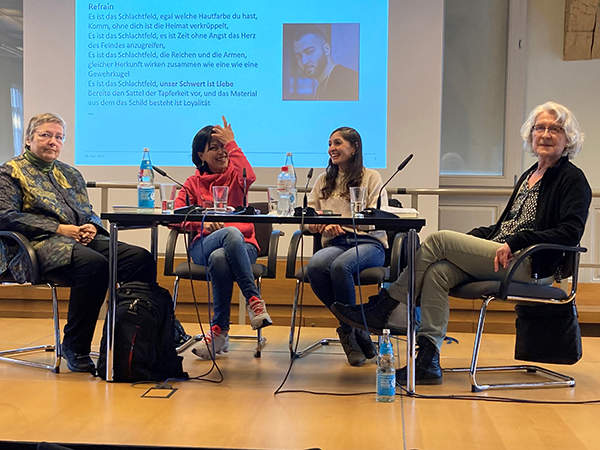By Ute Kaiser
The Iranian regime fights oppositionists with all its might and with all its means. They are threatened with persecution, torture and executions. But the regime also promotes sexualized violence against women. The rapists get away with it. Gilda Sahebi, a doctor and political journalist, also reports on this at lectures, in articles and in her book “Our Sword is Love”. The title comes from a song by the regime-critical rapper Toomaj Salehi. He is one of about 20,000 prisoners and has been tortured.
Gilda Sahebi was born in Iran in 1984, but grew up in Tübingen since she was three years old. Her father fought for a democratic Iran after the mullahs took power in 1979. That’s why he had to flee. Since then, the dangers for dissenters have not changed. The forced veiling, which was imposed almost immediately, is still enforced with brutal force four decades later. All who do not accept the clerics’ misogynistic view of humanity and want to live freely are accused of “depravity on earth” or “endangering national security.” These charges can mean a death sentence.
“The oppression of women is a central pillar of the Islamic republic,” said the political scientist in Tübingen. The death of Kurdish woman Jina Mahsa Amini was “one case too many” and fuel for the protests, she said. The uprising did not begin in Kurdistan by chance. There, “civil resistance has a long tradition,” Sahebi said. “Woman, life, freedom”: this is the slogan under which the protesters gather. Their conviction: A regime based on the oppression of women can only be overthrown by a feminist revolt.
Eighty percent of the people in Iran are against the regime, says Sahebi. They have not believed the news in the state media for a long time. They use social media instead. That’s dangerous. A special state unit controls the posts. Trolls spread false news there. The journalist always consults several sources to verify her information and not spread falsehoods.
Iranians no longer expect support from Western states. They pursue their own interests—for example, in the nuclear deal. This is causing anger. “It is the people of Iran who must decide their fate,” says Sahebi.
“The regime will only fall from within”—by having its own people leave the system. There have reportedly been defections in the military as well. But dictators bought loyalty. The supporters profit from it. The journalist reports that the regime makes them very rich.
The struggle for human rights and freedom goes on throughout the country. It is carried by Shiites and Sunnis as well as people of different ethnicities, says Sahebi. She places great hope in the younger generation. Above all, she says, the youth have “broken with the ranks of the old.”
How can people in the West support Iranians? The journalist has an answer to this question as well: through engagement. “Every smallest gesture makes a difference.” Sahebi, like the exile organization “Avaye Iranian,” for example, relies on solidarity demonstrations and pressure on German politics to isolate the regime in Iran.
tun23042101
www.tuenews.de
Gilad Sahebi (zweite von rechts) auf dem Podium mit Sepideh Langeroudian (Avaye Iranian), Ruth Scoralick (Gleichstellungsbeauftragte der Universität Tübingen) und Luzia Köberlein (Gleichstellungsbeauftragte der Stadt Tübingen). Foto: tünews INTERNATIONAL / Ute Kaiser.
001957




